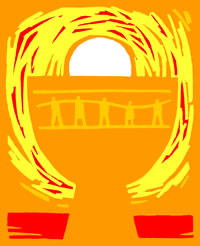
Body and Blood of Christ Year C (Corpus Christi)
Today’s liturgy, like that of last Sunday, invites us to a deeper appreciation of the Paschal Mystery we have just celebrated. Today we renew our faith in the great sacrament in which the Saviour’s Paschal Mystery gives life to the Church age after age.
The gospel reading from Luke makes clear the central place given to the Eucharist in the community for which the gospel was written. In Luke’s narrative, Jesus, after completing his Galilean ministry, turns his attention to the formation of the apostles. He has them share in his mission by sending them to preach the good news and to heal the sick. Confronted by a crowd that has neglected to provide themselves with nourishment in their eagerness to stay in his company, Jesus has a new lesson for The Twelve. ‘Give them something to eat yourselves’, he tells them. There can be no doubt, as the narrative continues, that Luke sees these words as pointing to the Eucharist, the nourishing of the people of God that will be the centrepiece of the apostolic ministry. Taking the loaves and fish, Jesus ‘raises his eyes to heaven’, pronounces ‘the blessing’ over the loaves, and then ‘breaks them’. Though provided by Jesus, the nourishment is given to the people through the ministry of the apostles – who are instructed to organise the people ‘in parties’, to distribute the loaves and fish, and to collect the scraps.
St Paul’s letter to the Corinthians gives us the oldest extant account of the institution of the Eucharist. Paul writes barely twenty years after the crucifixion; but he makes it clear – using the technical language of the rabbinical tradition in which he was formed – that he is handing on an authentic and sacred tradition of the Christian community. This is independently confirmed by the fact that Paul’s narrative of what happened at the Last Supper shows clear evidence of having been modified by repetition in liturgical celebrations. The implications of Paul’s brief account are momentous. ‘This is my body, which is for you’ (with manuscript variations, ‘given for you’, ‘broken for you’). In the Church’s central act of worship, Jesus makes himself the nourishment of the world, perpetuating the last act of his earthly life – in which he gave himself into the hands of his Father, for the life of the world. The words, ‘This is the new covenant in my blood’, echo the declaration of Moses as he inaugurated the first covenant (Exodus 24:8); but this is the ‘new’ covenant in which humanity’s final bonding with God replaces the shadows and types of the Old Testament. The celebration is a ‘memorial’ that ‘proclaims the Lord’s death until he comes’ – the constant faith of the Church since the beginning, that the Lord and his Paschal Mystery are present in the celebration of the Eucharist, finds strong support in the biblical overtones of these words.
The context of Paul’s words has great practical significance. Immediately prior to this passage, Paul rebukes the Corinthians for forming selfish and exclusive factions – as they gather to celebrate the sacrament that should awaken in them a love that is selfless, one with that of the Saviour!
John Thornhill sm

